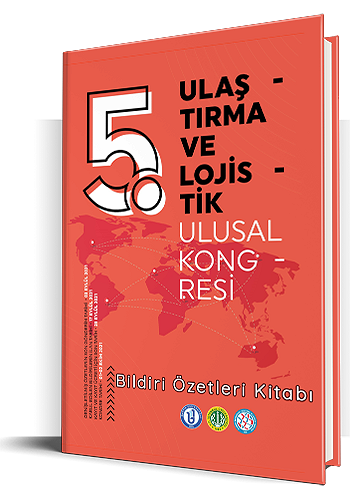
Ulaştırma ve Lojistik Kongreleri
- Türkçe
- Özet
- 2021
Lojistik Performans Endeksi ile İhracat-İthalat Arasındaki İlişki: E7 Ülkeleri Örneği
Mustafa Kavacik
Dr. Öğr. Üyesi, Necmettin Erbakan Üniversitesi, Konya, Türkiye
Küreselleşme olgusu, dünya ülkeleri için ticareti kilometrelerce uzaklara götürmeyi hedef göstermiştir. Dünya ticaretinden pay alabilmek için sadece şirketler değil, ülkeler de yarışmaktadır. Bu yarışta rekabet gücü çok önemlidir. Rekabet gücünün literatürde ölçüsü bağlamında bir kavramdan bahsetmek mümkündür. Dünya Bankası tarafından geliştirilen ve 2007 yılından beri standart bir şekilde yayınlanan Lojistik Performans Endeksi de rekabet gücü ölçmede kullanılan bir araçtır. Lojistik Performans Endeksi, araştırma içerisinde yer alan ülkelerin lojistik kalite ve yetkinliklerini ortaya koymaya çalışan ve her iki yılda bir yayınlanan bir anket çalışmasından oluşmaktadır. Dünya üzerinde ülkelerin gelişmişlik düzeyleri ve dünya ticaretinden aldıkları pay farklılık göstermektedir. Gelişmiş ülkeler olarak adlandırılan (G7-Group of Seven) ABD, Almanya, Japonya, Fransa, İngiltere, İtalya ve Kanada ülkelerinin ekonomik anlamda güçlerini gelişmekte olan ülkeler olarak adlandırılan (E7-Emerging Countries) Çin, Brezilya, Rusya, Hindistan, Türkiye, Endonezya ve Meksika ülkelerine kaptırmaya başladıklarını söylemek mümkündür. Bu konuda yapılan çalışmalarda E7 ülkelerinin G7 ülkelerini gelecekte birçok alanda katlayacağı da öngörüler arasında yer almaktadır. Bu çalışma, E7 Ülkelerinin ihracat ve ithalatının lojistik performans endeksi (LPE) üzerindeki etkisini araştırmak amacı ile yapılmıştır. Lojistik Performans Endeksi verileri Dünya Bankasının veritabanından elde edilmiştir. Lojistik Performans Endeksi verileri iki yılda düzenlenmiş olup, ilk veri paylaşımı 2007 yılında gerçekleşmiştir. Sonrasında sırasıyla 2010, 2012, 2014, 2016 ve 2018 yıllarında Lojistik Performans Endeksi değerleri paylaşılmıştır. Endeksin iki yıllık veri paylaşımdan dolayı önceki iki seneye ait ihracat ve ithalat verilerinin ortalaması alınarak analiz yapılmıştır. Dolayısıyla, 2007 LPE değeri 2005 ve 2006 yıllarına ait ihracat ve ithalat verileri ile karşılaştırılmıştır. Bu doğrultuda E7 ülkelerinin ihracat ve ithalat rakamları tek tek ele alınmamış, 2005-2017 yıllarına ait ihracat ve ithalat verilerinin de ortalaması alınmıştır. E7 ülkelerine ait ihracat ve ithalat verileri Uluslararası Ticaret Merkezi’nin (ITC) Trademap adlı veri tabanından alınmıştır. Çalışmada verilerin analizinde SPSS 25.00 kullanılmıştır. Verileri uygun bir şekilde kullanmak için logaritmaları alınmıştır. Böylelikle normal dağılım göstermeleri sağlanmıştır. Değişkenler arasında ilişki olup olmadığını belirlemek için korelasyon, ihracat ve ithalatın lojistik performans endeksi üzerindeki etkisini ortaya koymak için de regresyon analizi yapılmıştır. Çalışmada lojistik performans endeksinin genel boyutu üzerinden analizler gerçekleştirilmiş, ancak alt boyutlarına değinilmemiştir. Korelasyon analizi neticesinde; lojistik performans endeksi ile ihracat ve ithalat arasında (p<0,01) pozitif yönde anlamlı bir ilişki olduğu tespit edilmiştir. Lojistik performans endeksi ile ihracat arasındaki r= 0,977 olarak bulunmuştur. Bu katsayının p değeri 0,001 olarak tespit edilmiştir. Lojistik performans endeksi ile ithalat arasındaki r= 0,969; p değeri ise 0,001 olarak bulunmuştur. Dolayısıyla, korelasyon katsayısı değişkenler arasında anlamlı bulunmuştur. Sonrasında yapılan regresyon analizinde bağımsız değişkenler olan E7 ülkelerine ait ihracat ve ithalatın, bağımlı değişken olan E7 ülkelerine ait lojistik performans endeksi üzerindeki etkisi ortaya koyulmaya çalışılmıştır. İhracatın lojistik performans endeksi üzerinde anlamlı bir etkisi olduğu görülmüştür (p=0,001<0,01). Düzeltilmiş R2 değeri 0,943 olarak bulunmuş olup, bu da E7 ülkelerinin lojistik performans endeksinde gerçekleşen değişimin %94,3’ünün ihracat ile açıklandığı anlamına gelmektedir. Ayrıca, ithalatın lojistik performans endeksi üzerinde anlamlı bir etkisinin olduğu da tespit edilmiştir (p=0,001<0,01). Düzeltilmiş R2 değeri 0,923 olarak bulunmuştur. Dolayısıyla E7 ülkelerinin lojistik performans endeksinde gerçekleşen %92,3’lük değişim ithalat ile açıklanmaktadır.
Anahtar Kelimeler: E7 Ülkeleri, Lojistik Performans Endeksi, İhracat, İthalat
The Relationship Between Logistics Performance Index and Export- Import: Case of E7 Countries
The phenomenon of globalization has aimed to take trade miles away for the countries of the world. Not only companies but also countries compete to get a share from world trade. Competitiveness is very important in this race. It is possible to talk about a concept in the context of the measure of competitiveness in the literature. The Logistics Performance Index, developed by the World Bank and published in a standard way since 2007, is also a tool used to measure competitiveness. The Logistics Performance Index consists of a survey study that tries to reveal the logistics quality and competencies of the countries included in the research and is published every two years. The development level of countries in the world and their share in world trade differ. It is possible to say that USA, Germany, Japan, France, England, Italy and Canada, which are called developed countries (G7-Group of Seven) have begun to lose their economic power to China, Brazil, Russia, India, Turkey, Indonesia and Mexico which are called developing countries (E7-Emerging Countries). In the studies conducted on this subject, it is also among the predictions that the E7 countries will outnumber the G7 countries in many areas in the future. This study was conducted to investigate the effect of exports and imports of E7 Countries on the logistics performance index (LPE). Logistics Performance Index data was obtained from the World Bank database. Logistics Performance Index data was prepared in two years, and the first data sharing took place in 2007. Afterwards, Logistics Performance Index values were shared orderly in 2010, 2012, 2014, 2016 and 2018. Due to the two-year data sharing of the index, the analysis was made by taking the average of the export and import data of the previous two years. Therefore, the 2007 LPE value was compared with the export and import data for 2005 and 2006. In this direction, the export and import figures of the E7 countries were not considered one by one, and the average of the export and import data for the years 2005-2017 was taken. Export and import data for E7 countries was obtained from the Trademap database of International Trade Center (ITC). SPSS 25.00 was used in the analysis of the data in this study. Logarithms have been taken to use the data appropriately. Thus, it was ensured that they showed a normal distribution. Correlation was used to determine whether there was a relationship between the variables, and regression analysis was performed to reveal the effect of exports and imports on the logistics performance index. In the study, analyzes were carried out on the general dimension of the logistics performance index, but its sub-dimensions were not mentioned. As a result of the correlation analysis; It has been determined that there is a positive significant relationship between the logistics performance index and export and import (p<0.01). The coefficient (r) is 0.977 between the logistics performance index and exports. The p value of this coefficient was determined as 0.001. The coefficient is 0.969 between logistics performance index and imports; p value was found 0.001. Therefore, the correlation coefficient was found to be significant between the variables. In the subsequent regression analysis, the effect of exports and imports of the E7 countries, which are the independent variables, on the logistics performance index of the E7 countries, which is the dependent variable, was tried to be revealed. It was observed that exports had a significant effect on the logistics performance index (p=0.001<0.01). The Adjusted R Square value was found 0.943, which means that 94.3% of the change in the logistics performance index of E7 countries is explained by exports. In addition, it was determined that imports had a significant effect on the logistics performance index (p=0.001<0.01). The Adjusted R Square value was found 0.923. Therefore, the 92.3% change in the logistics performance index of E7 countries is explained by imports.Keywords: E7 Countries, Logistics Performance Index, Export, Import


Bu çalışma, kullanan kişilere orjinal çalışmadan alıntı yaptıkları sürece, çalışmayı dağıtma, değiştirme ve üzerine çalışma hakkı tanıyan Attribution 4.0 International (CC BY 4.0) lisansı ile lisanslanmıştır.
İletişim
İstanbul Üniversitesi Ulaştırma ve Lojistik Fakültesi
İ.Ü. Avcılar Kampüsü 34320 Avcılar/İstanbul
ulk@istanbul.edu.tr
+ 90 (212) 440 00 00 - 19200


